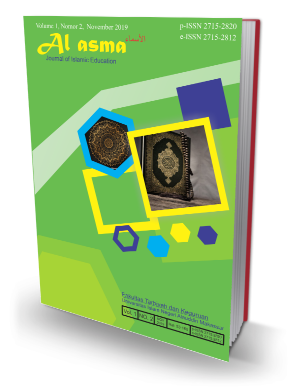PERBANDINGAN HASIL BELAJAR FISIKA PESERTA DIDIK BERDASARKAN KARAKTER INTROVERT DAN EKSTROVERT
Abstract
Abstrak
Penelitian ini termasuk jenis penelitian ex post facto bertujuan untuk membandingkan hasil belajar fisika berdasarkan karakter introvert dan ekstrovert peserta didik. Populasi dalam penelitian ini adalah seluruh peserta didik kelas XI MA Guppi tahun ajaran 2019/2020 yang berjumlah 51 peserta didik. Sampel terdiri atas dua kelas dengan jumlah peserta didik kelas A sebanyak 25 orang dan peserta didik kelas B sebanyak 26 orang. Instrumen penelitian yang digunakan yaitu angket psikologi (Jung’s Type Indicator Test) dan teknik dokumentasi. Teknik analisis data yang digunakan yaitu analisis statistik deskriptif dan inferensial. Dari hasil analisis deskiptif perbandingan hasil belajar peserta didik yang berkepribadian introvert dan ekstrovert yang paling dominan di MA Guppi Samata memiliki kepribadian ekstrovert sebanyak 26 orang (65%) dibandingkan dengan kepribadian introvert sebanyak 14 orang (35%) dan rata-rata hasil belajar peserta didik yang memiliki karakter introvert (82,62) lebih rendah dibandingkan hasil belajar peserta didik yang memiliki kepribadian ekstrovert (83,87). Hasil analisis memperoleh nilai Chi – Square 4,541 dengan taraf signifikan 5% Assymp. Sig 0,338 > 0,05 yang berarti tidak ada perbedaan yang signifikan antara tipe kepribadian ekstrovert dan introvert terhadap hasil belajar fisika kelas XI MA Guppi, sehingga disimpulkan bahwa baik peserta didik dengan tipe kepribadian ekstrovert maupun introvert keduanya mempunyai peluang yang sama dalam meningkatkan hasil belajar.
Abstract
This research is an ex post facto research which aims to compare the learning outcomes of physics based on the introvert and extrovert character of students. The population in this study were all students of class XI MA Guppi for the 2019/2020 academic year, totaling 51 students. The sample consisted of two classes with 25 class A students and 26 class B students. The research instruments used were psychological questionnaires (Jung's Type Indicator Test) and documentation techniques. The data analysis technique used is descriptive and inferential statistical analysis. From the results of descriptive analysis, the comparison of the learning outcomes of students with introverted and extroverted personalities, the most dominant in MA Guppi Samata, has an extrovert personality of 26 people (65%) compared to the introverted personalities of 14 people (35%) and the average learning outcomes of students. those who have introverted characters (82.62) are lower than the learning outcomes of students who have extrovert personalities (83.87). The results of the analysis obtained the Chi-Square value of 4.541 with a significant level of 5% Assymp. Sig 0.338 > 0.05, which means that there is no significant difference between extrovert and introvert personality types on the learning outcomes of physics class XI MA Guppi, so it is concluded that both students with extrovert and introvert personality types both have the same opportunity to improve learning outcomes.
Downloads
References
Anees, & Hambali, A. (2018). Pendidikan karakter berbasis Al-Qur’an. Bandung: Simbiosa Rakatama.
Rahman, A. B. (2016). Hubungan tipe kepribadian introvert dengan prestasi belajar pada mahasiswa FK UII angkatan 2013. Universitas Islam Indonesia.
Black, B., & Sarah, S. (2000). An investigation of study habits of introvert and ekstrovert. Liberal Arts and Science.
Gazzaniga, M. S., & Heartherton, T. F. (2017). Psikologis ilmu: pikiran, otak, dan perilaku. New York: Amerika Serikat.
Kunandar. (2017). Penelitian tindakan kelas. Jakarta: Rajawali Pers.
Laney, M. (2017). Introvert keuntungan: bagaimana berkembang dalam seorang ekstrovert dunia. New York: Penerbitan Pekerja.
Lestari, A. (2013). Analisis hubungan ekstrovert-introvert kepribadian dan peserta didik kinerja berbicara. pontianak: Universitas Tanjungpura.
Mulyadi. (2018). A compartive study on introvert and ektrovert students personality in english listening scores. Jurnal Of English and Teaching, 2, 15.
Suparman, U. (2019). Psikolinguistik:teori penguasaan bahasa. Bandung: Afrino Raya.
Sylene, H. P. S. dan M. A. (2018). Hubungan antara kepribadian introvert dan ekstrovert dengan speaking skill mahasiswa prodi D III Keperawatan Tahun Akademik 2017/2018. Akademi Kesehatan Rustida.
W, S. S. (2013). Pengantar psikologi umum. Jakarta: Raja Grafindo Persada.
Wengrum, T. (2018). Komparatif Belajar dari peserta didik bacaan pemahaman untuk memahami teks naratif antara ekstrovert dan introvert peserta didik kepribadian pada kelas satu SMA Negeri 1 Seputih Banyak. Universitas Lampung.
- Authors retain copyright and grant the journal right of first publication with the work simultaneously licensed under a Creative Commons Attribution License that allows others to share the work with an acknowledgement of the work's authorship and initial publication in this journal.
- Authors are able to enter into separate, additional contractual arrangements for the non-exclusive distribution of the journal's published version of the work (e.g., post it to an institutional repository or publish it in a book), with an acknowledgement of its initial publication in this journal.
- Authors are permitted and encouraged to post their work online (e.g., in institutional repositories or on their website) prior to and during the submission process, as it can lead to productive exchanges, as well as earlier and greater citation of published work (See The Effect of Open Access).

